Part Two: An exiled Sojourner, SBTS scandals, forced birth, AND MORE coffee
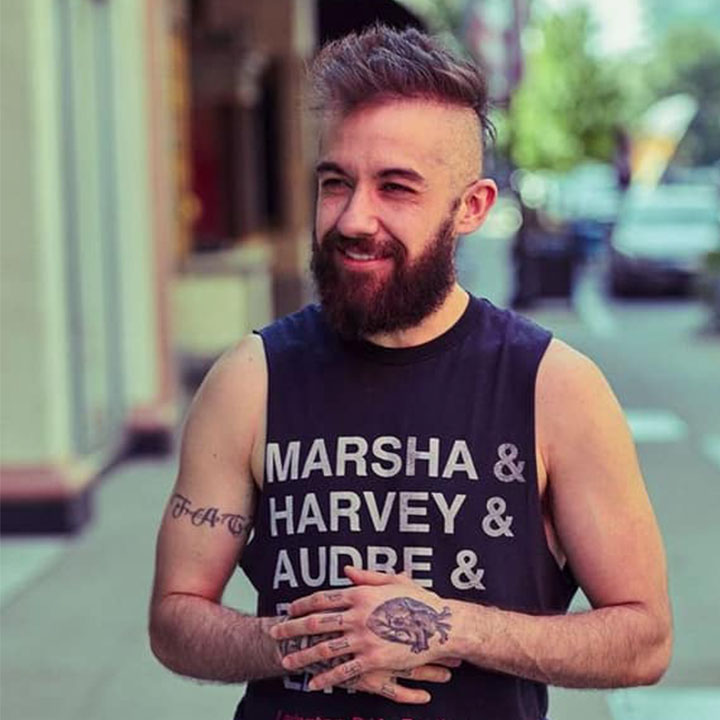
he/him
adrian@queerkentucky.com
Editor’s Note: Regarding boycotts: This article is the second installment in a series that is intended to raise awareness around the systemic injustices that poor, queer, working class Louisvillians (specifically baristas) experience, and the ways certain local religious institutions and powerholders contribute to these injustices. While increased awareness often does, and should, result in action, we defer to the workers to tell us what type of action would be most useful. According to the baristas who are fighting to unionize locally, our patronage (and our tips) are needed more than ever. So rather than boycotting, tip generously, follow the workers’ campaigns on social media, and check in regularly to see how you can best support their unionization efforts.
Birds of a Feather: Sunergos, Quills, Sojourn, and Southern
Local coffee chain Sunergos’s reputation as a Christian coffee shop, and more specifically, a conservative-leaning, queer-unfriendly Christian coffee shop, predates the 2015 controversy discussed in part one. Local coffee chain Quills enjoys a similar reputation. Where did this reputation come from? To answer this question, we need to look at the particular religious institutions that the businesses are in bed with (don’t worry: they’re married), namely: Southern Seminary and Sojourn Church.
When Sunergos’s co-founders Matthew Huested and Brian Miller met in 2001 at Sojourn Church, they were both pursuing their Masters of Divinity at Southern Baptist Theological Seminary (“Southern” for short). Local coffee chain Quills has its own history of entanglement with the Southern Baptist institutions. We reached out to Nathan Quillo (owner of Quills) as well as Matthew Huested (of Sunergos), to give them each a chance to comment. We didn’t hear back from Huested, but we did hear back from Quillo. His comments can be found at the end of the article.
Birds of a feather: white supremacy, rape culture, and institutional homophobia
Southern Seminary is a private, not-for-profit institution that consists of three separate schools: the School of Theology; the Billy Graham School of Missions, Evangelism, and Ministry; and Boyce College, an undergraduate program. Southern is part of the Southern Baptist Convention, a Christian denomination with a very un-Christian history.
What makes a Southern Baptist different from a Northern Baptist? Originally, it was their positions on slavery. The groups formally split into two distinct organizations in 1845 in the midst of the civil war. Ministers in the North were critical of slave-ownership and ultimately considered it to be a sin, whereas Southern ministers supported slave ownership, or at least condoned it: an irreconcilable difference that led the groups to sever ties. These origins live on in the denomination’s name, its history books, its buildings, and in its silence.
James Boyce, the founding president of Southern who the school’s undergraduate program is named after, was a chaplain to the Confederate Army who used his family’s plantation money to help build the seminary. The school’s first board president, Basil Manley Sr., served as the official chaplain of the Confederacy and was known for endorsing a biblical basis for slavery. Manley’s son, who was also a founding faculty member, was a slave owner who has a dorm named after him.
According to a 2018 report issued by the Southern’s current president, Albert Mohler, each of the seminary’s founding faculty members were deeply involved and/or deeply complicit in slavery. To be exact: the founding faculty together owned over 50 slaves. Included with the report was a letter from Mohler that expressed the school’s “lament” for this history, but offered no reparative or corrective action, saying “We must repent for our own sins, we cannot repent for the dead.”
When prominent Black Southern Baptist pastor Dwight McKissic urged Southern to remove the names of the slave-owning founders from their campus buildings, Mohler responded saying “As president of this institution, it is certainly not my intention to remove those names from either the buildings or from the school. There would be no school and none of these buildings would matter but for the founding vision of those original faculty members.” In 2019 Mohler denied a request from an interracial ministers coalition to financially support a nearby historically Black college as a form of reparations, stating “We’re not going to respond to public demands for reparations made, quite interestingly, by the people who demand that the reparations be paid to them.”
If an institution has a history of racial violence, you’re likely to find sexual violence there as well. This is because the systems of domination on which the U.S. was built—racism, sexism, imperialism, and classism—are all interconnected and mutually-reinforcing. Bell Hooks refers to this as the “imperialist white supremacist capitalist patriarchy.” The Southern Baptist Convention is a prime example.
Southern Baptist Convention former-president Johnny Hunt was accused of sexually assaulting another pastor’s wife in 2010, claims which were found credible. He is now planning a return to ministry. In a tribute video they made for Hunt, pastors who served on his “spiritual team” claimed to have observed a “genuine brokenness and humility before God” suggesting Hunt had learned his lesson. According to the Washington Post, the video made no mention of Hunt’s victim or any efforts he had made to make amends for his actions.
Hunt is just the tip of the iceberg. From 2018 to the present, the Southern Baptist Convention has been in the news after investigations into top officials revealed a “deliberate effort within the organization to suppress reports of sexual abuse and protect over 700 ministers and church workers who were credibly accused of abuse.” An independent team conducted 300 interviews and collected five terabytes of data in a 300 page report. In August of 2022, the Southern Baptist Convention announced that it was facing a federal investigation into the scandal.
One of the people who spoke out was Jennifer Lyell, a woman who attended Southern. Lyell was motivated by the account of Megan Lively, who was raped by a fellow student at Southern and then counseled by the seminary’s president to not report the incident. The organization’s own newspaper did a story on it, but changed the story just before it went to print to make it read as if the relationship had been consensual. The article reported that Lyell admitted to having a “morally inappropriate relationship” with her former seminary professor, a claim that was later proven false.
Given its long history of race and gender-based violence, it is unsurprising that the Southern Baptist Convention is also famously, and shamelessly, anti-queer. In 2015, Louisville LGBTQ+ advocacy group The Fairness Campaign organized a rally on Southern’s campus to protest the school’s use of conversion therapy, or to use Southern’s preferred language: counseling to bring about “a transformed Christian sexuality manifesting itself either in heterosexual monogamy or celibacy.” That same year, Southern’s president Albert Mohler told reporters that “for many, many people struggling with these patterns of sin, it will be a lifelong battle.” Regarding trans kids, he stated that “there is never a justifiable reason to affirm transgender kids’ confusion. These things aren’t negotiable.” In 2022, Campuspride.org still lists Southern among the “absolute worst, most unsafe campuses for LGBTQ+ Youth.”
Southern’s 2022 Doctrinal Statement states:
Based on these affirmations, we believe that premarital sex, extramarital sex, homosexual activity, and transgendered behaviors violate clear biblical teaching on sexual purity […]Therefore, behavior inconsistent with these Biblical standards contradicts the values of our covenant community and is prohibited even when consensual. […] Consistent with our desire to teach and model a biblical approach to sex, SEBTS prohibits the practice or any form of private or public advocacy for the idea that sex outside of a biblically defined marriage is morally acceptable (including the affirmation or participation in same-sex or transgendered dating or marriage advocacy, participation, and/or other related behaviors). […] WE DENY that God has designed marriage to be a homosexual, polygamous, or polyamorous relationship. We also deny that marriage is a mere human contract rather than a covenant made before God… WE DENY that adopting a homosexual or transgender self-conception is consistent with God’s holy purposes in creation and redemption… WE AFFIRM that it is sinful to approve of homosexual immorality or transgenderism and that such approval constitutes an essential departure from Christian faithfulness and witness… WE DENY that the approval of homosexual immorality or transgenderism is a matter of moral indifference about which otherwise faithful Christians should agree to disagree… WE AFFIRM that the grace of God in Christ enables sinners to forsake transgender self- conceptions and by divine forbearance to accept the God-ordained link between one’s biological sex and one’s self-conception as male or female.
The implication of this doctrine is that queer people need to change fundamentally in order to be acceptable in the eyes of God. Whether that change looks like eradicating their queerness through prayer and conversion therapy, or repressing their attractions / gender identity through abstinence / living as the gender they were assigned at birth, the core message is that being okay with who or what you are is a sin. Their qualification that this sin is “no worse than any other” is not the consolation that they think it is. I personally think it is more insulting to be told that my transition is no worse than lying, cheating, or stealing. If you’re going to call it a sin, at least don’t make it a petty one. At least call it deadly. Because that’s what your indoctrination is to the queer person who internalizes it.
Matthew Truett, a former Southern student who was expelled for being queer, provides this firsthand account of the damage that the above doctrine causes:
Southern was, for lack of a better word, a total mind fuck. The October before I moved to Louisville to go to Southern, I had officially come out to my family and friends. Their disdain was actually what drove me to enroll at Southern because I wanted to make them proud and make them look at me like I wasn’t dashing their dreams of a “committed missionary for Christ.” So, I consciously decided to go back in the closet in order to make Southern work, and it was hell. I lived on campus, worked on campus, and went to classes on campus. I only left campus in order to go to church (Sojourn) or small group. Southern was my entire Louisville life, until it wasn’t.
When you enroll in classes at Southern (in 2014), you had to sign the Honor Code first. You couldn’t even get to the online form to register for courses without first signing the Honor Code. The Honor Code had your standard “no drinking,” “no drugs,” “no porn or sex before marriage”, “no going to bars” (you could not even enter a bar without being at risk for being in offense to the Honor Code). They also had statements making you agree that you would not file a lawsuit against anyone while being a student and agreed to non-legal, Christian/pastoral mediation for legal matters. You also could not get divorced while enrolled at Southern. As you guessed it, you could not be gay or engage in homosexuality (sex, relationships, marriage, etc).
At that time in American history, this was before the landmark Obergefell case, so gay marriage was illegal in Kentucky anyway, but even the self-identity as LGBT made you ineligible for enrollment. Of course, I lied, registered for classes, and started my grad program. In fairness, in Evangelicalism, Southern is pretty prestigious, and their president Al Mohler is highly influential in Evangelical social circles. If I was going to sacrifice my very sexuality, I wanted a top-notch education from one of the pinnacles of American Christian education, so Southern was my one and only choice for my Mdiv program.
I lived on campus, and as the national conversation started ramping up regarding the possibility of a federal marriage decision for Queer people, other students’ blatant disgust and homophobia ran unchecked. Gender roles are very strict at Southern (women cannot take preaching classes because women cannot be ordained in the Southern Baptist Convention), and even men who enrolled in the Biblical Counseling tract were mocked because that was what female students traditionally studied. Seminary dorm life makes locker room talk look like child’s play. I knew who I was and what I was sacrificing to even be able to sit in the same common spaces as these men, so I kept a lower profile.
My internal struggle of sequestering myself as well as my own growing disgust for the men around me drove me to start asking questions such as, “Would it really affect straight marriage if gay marriage was legalized?” This raised many red flags amongst the dorm life leadership (who were also fellow students), and, quickly, my name was taken to the Dean of Students. I was called into the Dean’s office, and he asked me frankly, “Are you a homosexual?” I answered honestly and said yes. With this yes, I was swiftly evicted from my dorm room, fired from my on-campus job, and left expelled and homeless in a new city.
It’s clear from Matthew’s story that leadership at Southern is trained to identify the “signs” or “red flags” of homosexuality and report them as soon as they are detected: the textbook definition of a witch hunt. In Matthew’s case, it backfired, because after they left Christianity they discovered Paganism, and now they are a literal witch. We love to see it. But in all seriousness, I’m just glad they lived to tell their story. Not everyone does.
One would like to think that the owners of Quills and Sunergos were simply ignorant, or unaware of the Southern Baptist stance on homosexuality as young people, and that they abandoned those doctrines once they became more informed. Unfortunately, Quillo still aligns himself with Sojourn in Ballard’s 2014 article, and when they left the seminary to pursue careers in coffee, Huested and Miller brought their Southern Baptist Christianity with them.
After Sojourn, Huested got involved with Immanuel Baptist, another Southern Baptist church in Louisville who includes on their short list of community partners BsideU For Life and Speak for the Unborn. The former is an anti-abortion clinic, the latter an anti-abortion activism group. “We highly encourage you to join them on the sidewalk at the local abortion clinic, exhorting men and women with the truth of the gospel” states the church’s website. The website also advertises free counseling services which treat “sexual sins” including homosexuality. Certification is not a requirement for counselors; in fact, any church member who is interested can attend their free quarterly training. Currently Huested is a member at First Baptist Church of Olive Hill, yet another Southern Baptist church and member of the Southern Baptist Convention.
Now let’s turn to Sojourn: which Quillo helped found, where Huested and Miller met, and whose bait and switch tactics led to Matthew’s retraumatization.
Christian Hipster Headquarters
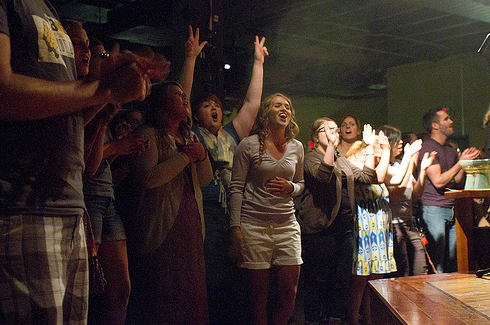
You can’t talk about Sojourn’s origins without at least mentioning Quills. Sojourn’s website tells the story of how the church started as a bible study in Nathan Quillo’s apartment. When the group outgrew the apartment, Quillo started meeting with folks at Southern Seminary to discuss logistics of church planting. Quillo himself came up with the name “Sojourn,” which is based on a song by Christian musician Rich Mullins. According to Sojourn’s website, Quillo eventually stepped away from leadership, but remained a core part of the team.
Sojourn was launched in 2000 in Louisville’s Shelby Park neighborhood. While the church is known for its hipster aesthetic (think tattoos and skinny jeans), its official doctrines are just as old school and problematic as Southern’s. The hipsters at Sojourn hide their bigotry behind indie music, handlebar mustaches, and oat milk cortados, but the church’s bylaws are crystal clear:
How does Sojourn square this statement with the accepting, laid back, open-minded image they project? In 2008, a LEO journalist asked a group of four Sojourn pastors this very question. The pastors responded: “Gays are free to come to Sojourn, but only after they acknowledge that they need to be saved from the sinfulness of being gay.” In other words: we don’t think gays should be banished from society, we’re just saying they need to act straight if they want to sit with us (and not go to hell).
“But we do welcome you,” says the Sojourner, “as a child of God.” To which I say: that statement is meaningless. What you welcome is an idea, not a person. What’s more, it’s an idea I don’t believe in or relate to. Your “welcome,” like your love and acceptance, is completely removed from the contents of my experience, mind, heart, and life, that is, my person. Those contents, my person, is precisely what you reject.
In his widely-read 2014 article, “How Christianity Shapes Louisville’s Coffee Culture,” author Gabe Bullard asks Quillo to describe Sojourn. Quillo says that it’s a “theologically conservative church but socially liberal.” If you’re scratching your head at this description, you’re not alone. What Quillo means by “theologically conservative” (anti-gay, anti-trans, anti-feminist, etc) is what most people mean when we say “socially conservative.” Is Quillo saying that Sojourn is socially conservative but socially liberal?
Before anyone can accuse him of contradicting himself, Quillo quickly clarifies that by “socially liberal” he doesn’t mean “politically progressive.” What he means, according to Bullard, is “All the things that make Sojourn appealing to a younger crowd—the embrace of youth culture, the hosting of concerts, the prevalence of ink and spacers among followers, the decision to not constantly trumpet Baptist views.” But why does Quillo use such confusing language? Why not just say that Sojourn is socially conservative, but still finds ways to appeal to a younger crowd? And as a journalist, why doesn’t Bullard pick up Quillo’s shifty wording and get to the bottom of it?
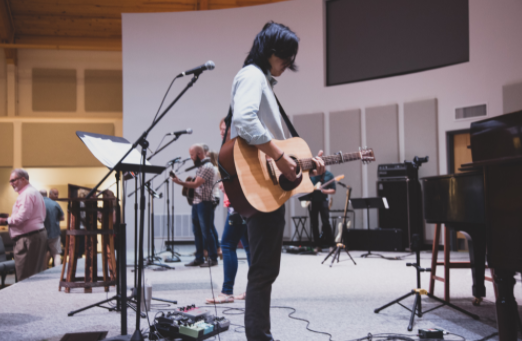
Throughout the article, it becomes increasingly clear that Bullard is personally invested in preserving the facade that his interviewees have curated. He portrays Sojourn’s critics as conspiracy theorists, writing that there are “comments and questions, hinting that [Sojourn’s] coolness is, at best, a mask for disagreeable views on homosexuality and women in leadership, and, at worst, a smokescreen for attempts to convert.”
But the hipster aesthetic is not what Sojourn’s critics find deceptive. What we find deceptive is the way that Sojourner’s hide, omit, or obfuscate their doctrines from outsiders, until they have their hooks in them. This is the real issue, so why is Bullard dodging it? What’s his angle? “Who me?” I imagine him saying. “I’m just a guy who writes about culture, and who happens to be a Christian. Of course I’m cool with gay people.” As he actual says: “Spend enough time at Quills or Sunergos, and you’ll inevitably hear a band with a gay member on the stereo.”
Bullard quotes an elder at Sojourn: “We don’t wave the baptist flag, because we don’t want to be divisive.” In other words: they don’t want to scare newcomers away. But at the end of the day, they still hold the same views as all the other Southern Baptists. They still won’t perform, host, attend, or otherwise support your gay wedding. They still won’t let you work for them until you’ve renounced your “sinful lifestyle” and committed to a life of celibacy. Once again, Matthew had to learn this the hard way.
In the wake of my expulsion, I was encouraged by the Dean of Students to continue going to the new church that I had just recently begun, Sojourn Community Church – Midtown Campus, because he thought that they would be a good community in this “season” of struggling with “SSA” (Same-sex attraction). I had started Sojourn Midtown earlier in the semester; and since my vocational aspiration was dashed, I clung to Sojourn for community and purpose. In my membership interview, I came out to the pastor who was conducting my interview as a litmus test for acceptance; I couldn’t emotionally or spiritually handle being rejected from both my school and my new-found church.
To my surprise and elation, my being out was not disqualifying to my membership process and I was soon extended official membership. Their acceptance of my gay presence in their weekly Sunday services and weekly Community Group meetings (a small group that met to discuss the sermon further) inevitably weakened my defenses that I had put up against Christians. Not only did they not treat me as “the sum total of my sins”, but they allowed me to be as involved as I wanted in weekly services (serving communion, assisting with PowerPoint during service, greeting people as they came in for service, etc) as well as involved with the Sojourn Network: the broader church-planting organization which establishes churches around the nation. Of course, all of this involvement and community and belonging hinged on one crucial caveat: I had to remain a celibate, albeit, out gay Christian. As long as I was celibate or at least repentant when I “fell” to my SSA, I was beloved and welcomed.
The deceit came from their overwhelming love and inclusion while I languished compliantly under their constraints of my sexuality. This deception became abundantly clear when I got into my first relationship 4 years into my membership at Sojourn. I had a new boyfriend and we lived together, which severely offended the one condition to their Christian love. Because I was “unrepentant” (I refused to break up with my boyfriend when they begged and coerced me to), they initiated their process called “Church Discipline.” Church Discipline is Protestant excommunication. Every church handles this differently, but in Sojourn’s case, they assign 2 pastors to an individual’s “case,” and it is those 2 pastors’ duties to the Church and to the Board of Elders to convince the individual to repent and to report back to the Board all of their interactions with the individual. If the individual repents, the investigation is resolved, the individual goes into Sojourn’s own form of counseling, and continues in community with the Church as a whole. However, if the individual is unrepentant, the individual’s case is shaped into a timeline including every interaction the individual had with their assigned pastors in order to prove that attempts had been made to bring the individual to a point of repentance. This timeline is then shared with all the other members of Sojourn at a quarterly member’s meeting and then voted on by the members whether the individual should be excommunicated or not.
This happened to me. I received a 3 page letter from the church that I called home for 5 years delivered as certified mail (I had to sign in order to prove to the sender (Sojourn) that I had received it) informing me that my relationship and “subsequent cohabitation” put me in offense with Sojourn and with God. My investigation lasted 7 months and one of the 2 pastors assigned to my case was my best friend. The Board of Elders even told my friend that if anyone could convince Matt to repentant, it was him. I didn’t repentant, and after 7 long, painful, tear-filled months, I was excommunicated from Sojourn.
An interesting note regarding my excommunication: remember that whole timeline-spilling your intimate details to the entire congregation-people vote to have you removed thing? Well, that didn’t happen in my case. Conveniently enough, the Board exercised their right to change the format of member meetings just before my excommunication so that my name would simply be on a PowerPoint slide with other people who “requested to have their membership removed from Sojourn.” No details of the last 7 months, no airing their “gay grievances” before the congregation; they simply rushed me out the proverbial back door and brushed it off as my choice to leave. I find this interesting because when I called them out for trying to save face with the larger Louisville community as being this welcoming accepting church, their only defense was “we reserve the right to change the format of the church discipline in order to love the individual in the best way possible.”
Sadly, I am not unique with regards to Sojourn discarding “problematic”, “non-compliant” Queer individuals. Queer people come into Sojourn because of an emphasis on the arts, or the genuine-feeling of welcomeness from the congregation, or any other reason; but Sojourn knows that these are all tactics they manipulate in order to get the “alt” artsy crowd into their doors. That’s why they don’t immediately discard Queer people, rather they see how compliant the Queer members can be and for how long; knowing that when the Queer members step out of line, they have policies in place to handle them. Everyone’s story is their own to tell, but I know that there is a person who held a position within the church who has had to go through a similar experience to mine because of their Queer identity. It’s disgusting and the bait-and-switch has to stop! I can handle the enemies that I know; but the betrayal of wolves in sheep’s clothing especially from a community who knows the sordid past of American Christianity and the Queer Community is truly soul-crushing.
I was devastated. Christianity was my only real cultural reality for the first 28 years of my life, and now not only had I been rejected from Christian education, I had been rejected by the church who was “supposed to be different.” They were my family, and the ultimate betrayal came from my best friend who literally built a case against me to have me removed from Sojourn. Frankly, it was too much to process, and some days, I still don’t think it has all been resolved emotionally and spiritually. There is a unique burden Queer people of certain faiths have to deal with: the fact that even our existence on Earth is an affront to the deity who we love more than anything.
Being excommunicated from one of the most “progressive-leaning SBC churches in Louisville” would be pretty punk if I didn’t care about the relationships and the life I had built within Sojourn. I literally moved into an apartment 3 doors down from Sojourn just to make myself as available as possible to Sojourn. Sojourn Midtown and Sojourn Network was my entire Louisville family until they weren’t, and I was left to pick up the pieces and rebuild as best as I could. That started with a proud apostasy from Christianity in its entirety; I began researching the gods of my ancestors and cleaved to them as a source of strength in an impossibly difficult time. I shunned every appearance of Christianity, and eventually left Louisville for Chicago in order to live in a city that didn’t have so many complicated, broken memories.
The question of “What would I say to Sojourn or Southern if I had their undivided attention?” has haunted the corners of my mind for nearly 4 years. With a fierce dedication to my Queer Community, I would ask if they know the depths of the ramifications of their theology? I loved Jesus as the figure seen in the Gospels, and your hatred and need to control me stamped that out. It is only now as I continue to process, heal, and learn, that I am able to finally start pursuing a relationship with Christ without the Christianity; but that is no thanks to you. The leaders who I trusted to teach me Scripture. The pastors who I trusted to lead and protect me as Christ does His little ones. The friends who I shared life with for years all for it to be used against me to get the crazy Queer back in their cage.
Your rhetoric and theologies have an effect that dismantles an individual’s very essence of self before the great unknown, and that has devastating effects that cannot be undone. I will never be able to enjoy a personal relationship with Christ without constantly fearing damnation because my approach to Christ is Queer and full of magick. I will always have a lingering fear of Hell (even though I no longer believe in Hell’s existence) because I was constantly reminded for 3 decades that my Queerness has only one final resting place. Sojourn, your theology is evil and your false sense of security you use to lure people in is as anti-Christ as anyone possibly could be. Your theology kills people, sometimes physically, but always spiritually, emotionally, and mentally.
How to attract Christians and repel gays (and how to not)
According to Bullard, neither Quills or Sunergos have “done anything to make their shops appealing to Christians, apart from being Christians themselves.” But if Christians find these spaces appealing because it’s public knowledge that the owners share their beliefs, values, and affiliations, doesn’t it make sense that queers would be deterred from those spaces for the same reasons? And maybe this isn’t the owners’ intention, but intention is not the same as impact. If the intention is for everyone to feel welcome, and that’s not happening, then they need to do something different.
In a world where racists, xenophobes, and homophobes have no issue going into a nightclub or grocery store and shooting whoever doesn’t look like them, love like them, or share their beliefs, marginalized communities are going to need more than so-called “political neutrality” to feel safe (forget feeling included). For one thing, we need to know that others in the space know that we are welcomed to be there. I need to know that if I show up in a gender-nonconforming outfit, or on a non-hetero date, or with a group of visibly trans folks, we’ll be treated with the same respect and courtesy as anyone else. We won’t be stared at, whispered about, or given the side eye when we share a brief kiss or hold hands in the open. People won’t complain or cause a scene over which restroom we use. We won’t be misgendered from the moment we enter the building to the moment we leave. And when incidents do happen, management will understand the gravity of the situation and take action–just like they would if they themselves were trans.
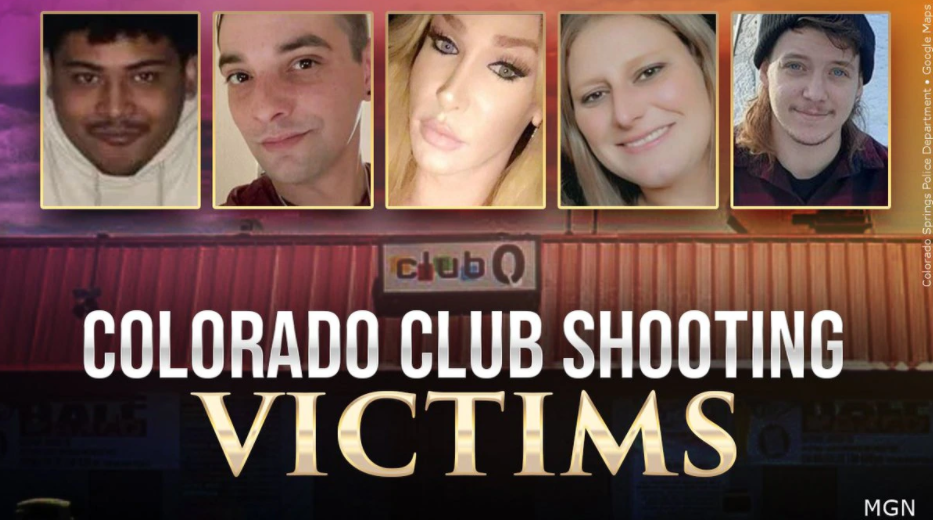
What would it take for me and my chosen family to feel safe at Sunergos or Quills? Like any relationship where trust has been broken, there is no quick and easy solution. The owners would need to take a deep look inward, and ask themselves if they honestly want queers to feel safe in their spaces–especially considering that it will require a bit of sacrifice on their part. It will cost them some money upfront (but ultimately help their bottom line, as studies show) and some homophobic customers (who will be replaced by accepting ones) and it will cost them their reputation as a conservative-leaning, anti-queer business. But it doesn’t have to cost them their faith, or even their reputation as Christian-owned establishments. They could be known instead as a queer-affirming Christian coffee shop: a gathering place for queers, Christians, and Christian queers. Some die-hard atheists would probably still avoid the place, and so would some Southern Baptist Christians. But I know plenty of atheists, agnostics, and non-Christian people of faith who are more than happy to share space with Christians who are happy to coexist.
Of course, it’s not enough just to do a rebrand. The owners would have to be willing to acknowledge that, as white cisgender men, they don’t know the solution to build trust with oppressed groups that are currently wary of them. They would have to get comfortable asking for help, accepting feedback, and treating marginalized individuals as the experts of their own experience. Building trust requires time, patience, consistency, vulnerability, and dedication. It’s not something you can achieve in a quarter, or by ticking a certain number of boxes. It’s a living, breathing relationship that must be tended to with ongoing care.
If Quills and Sunergos were to go this route, they would be going against the Southern Baptist doctrine which states “We deny that the approval of homosexual immorality or transgenderism is a matter of moral indifference about which otherwise faithful Christians should agree to disagree.” And what a victory it would be for social justice, as well as for Christianity, if they publicly renounced this doctrine.
On the other hand, if they can’t meet these basic standards of inclusivity, then they should not posture as inclusive or “progressive.” Because it’s more than just a matter of false advertising: it’s a matter of life and death.
*
An interview with Nathan Quillo
According to one account, which is featured on Sojourn’s website, you played an integral role in the founding of Sojourn, whose stances on LGBTQ+ identity have caused a lot of harm to the queer community. Do you stand by these doctrines?
Yes, I did play a part in the founding of Sojourn. I grew up Catholic, but the church didn’t mean much to me as a young person. In my early twenties, when my faith became important, I took a job as a youth leader at a Methodist Church. A few years in the church fired me for being too progressive. The experience left me hurt and disillusioned. A few of the volunteer leaders and I began meeting on Wednesday evenings until we found new churches, if and when we decided to go back. That group was the original core group of Sojourn. After several months, we were introduced to a guy connected to the Southern Baptist Seminary. The decision was made that Sojourn would move toward joining the SBC and become an “official church.” I stepped away from leadership during this time because I was dealing with significant personal issues that required much of my time and energy. That was almost twenty years ago, and much of my thinking has evolved. And as I reflect on it now, I no longer align with all the doctrines.
If not, how has your thinking changed? Have you done anything to repair the harm that Sojourn has inflicted on the queer community?
I’m much more committed to supporting and affirming my LGBTQ+ friends and colleagues. I have been out of Sojourn leadership for a long time, so I don’t know of specific instances of harm. But for anyone in the queer community who has experienced emotional damage, I am very sorry. I would hope by now, they have found healing and a community that supports them with the love and kindness they deserve.
You are quoted in a 2014 article, “How Christianity Shapes Louisville’s Coffee Culture,” describing Sojourn as “theologically conservative” but “socially liberal.” Your use of socially liberal here is unconventional, and could be read as misleading, contradictory even. Sojourn has been criticized for using similarly misleading messaging, particularly by queer people of faith who joined the church thinking that it was affirming, and left the church (and/or the faith) after it proved not to be. How would you respond to the critique that Sojourn is intentionally misleading people?
Shortly after this quote from 2014, Sojourn experienced significant organizational changes. This dramatic shift caused me to shy away from the church even further. I’m not entirely sure, but from my occasional chats with Sojourn staff, it seems they would no longer use the term “socially liberal.” Of course, no one likes a bait and switch, so I certainly see how this vague messaging can be misleading, frustrating, and potentially harmful.
How important is diversity and inclusion to you as a business owner and employer? What does a diverse and inclusive establishment look like in your mind? A diverse and inclusive work environment?
When I started Quills, I envisioned a specialty coffee space that was safe and welcoming to all people. So yes, diversity and inclusion are important to me. Over the years, I’ve heard various versions of the rumor, “Sojourn owns Quills.” For the record, this is not true. I started Quills by borrowing $35,000 from a family member. Fortunately, I was able to pay them back, so I took out another loan and kept working. Quills slowly grew due to the hard work of many fantastic baristas, managers, and operations leaders. Most have moved on, but a few are still around. The majority of my entrepreneurial journey has been on-the-job training, so I’ve made many mistakes running my business. But each has been an opportunity to learn and improve. I underestimated the hard work it takes to create a diverse and inclusive establishment, but I’m pleased that Quills continues to work on our diversity and inclusion initiatives, such as our employee survives for feedback and suggestions, partnering with local organizations like Feed The West and scheduling routine discussions to hear from any marginalized employees. Our current leadership teams are very committed to these initiatives. For our type of work, I think inclusion is communicated through the kind of people greeting guests from behind the bar. If guests see that they can identify with some employees, it creates a sense of welcome and safety. For the employees, it’s much the same, but company leadership must also establish a culture of trust through policy and procedure, practicing empathy, and developing ongoing training.
Would you say that Quills prioritizes diversity and inclusion? Are there any particular goals you have for the business, as concerns diversity in recruitment, retention, or leadership roles?
We prioritize diversity and inclusion at Quills, but we can improve. The current cafe management and leadership team is a healthy 50% split between males and females. This balance is great, but currently only 18% of our employees openly identify as LGBTQ+, one of which is in management and will soon be moving into regional management. Again, I’m pleased with this, but I would like to see the percentage of LGBTQ+ employees increase. I’d also like to see more people of color working at Quills. We routinely discuss how this can happen at leadership meetings and spent significant time at this year’s annual leadership getaway, strategizing diversity and inclusion plans for 2023.
Are there any specific practices your business uses to protect and include marginalized employees?
We use a job application form that includes questions regarding diversity and inclusion for people seeking work at Quills. This form helps us communicate our desire to build an inclusive workplace and helps us protect marginalized employees by screening answers that may threaten an inclusive culture. We also invite employees to share their pronouns on our internetwork, so coworkers can learn how to best address each other. In all our onboarding training, we highlight our expectations that all employees will respect and support an inclusive work culture. We have also started informal discussions with our employees on sensitivity training, which we plan on rolling into mandatory training workshops in 2023.
Do you support the union efforts taking place in Louisville? If your workers decided to unionize, would you be supportive? Why or why not?
I’ve never worked with a union, but from the little research I’ve done, it seems many unions run well and genuinely support the best interests of the employees and the companies with which they work. However, some union efforts have created extra work, frustration, stress, and poor results for employees and employers. The profit margin is very slim for coffee companies, especially those without drive-throughs. So there would need to be plenty of due diligence to ensure that unionizing would be good for everyone; baristas, managers, and leadership. But if the results benefit everyone, I would gladly support a union.
Would you say that your workers make a living wage? Do you think it reasonable of them to expect to?
I would say most of the employees at Quills make a living wage, although I’d like to see an increase across the board. Currently, the base pay for baristas is $10 per hour, moving to $11 after all training is completed, with an average of $8.16 per hour in tips. Our Lead Baristas start at $12 and move to $13 plus tips. The goal in opening three more cafes is to increase the sales volume needed to incrementally raise wages to the barista base pay of $15 per hour. Additionally, I would hope for continued growth so we can continue expanding our benefits packages to be in line with major medical coverage offered by other businesses. I’m not sure how long this will take, but these are my goals. So, yes, it’s reasonable for our employees to expect to make a living wage.






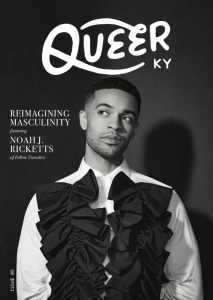






Leave a Reply
Want to join the discussion?Feel free to contribute!